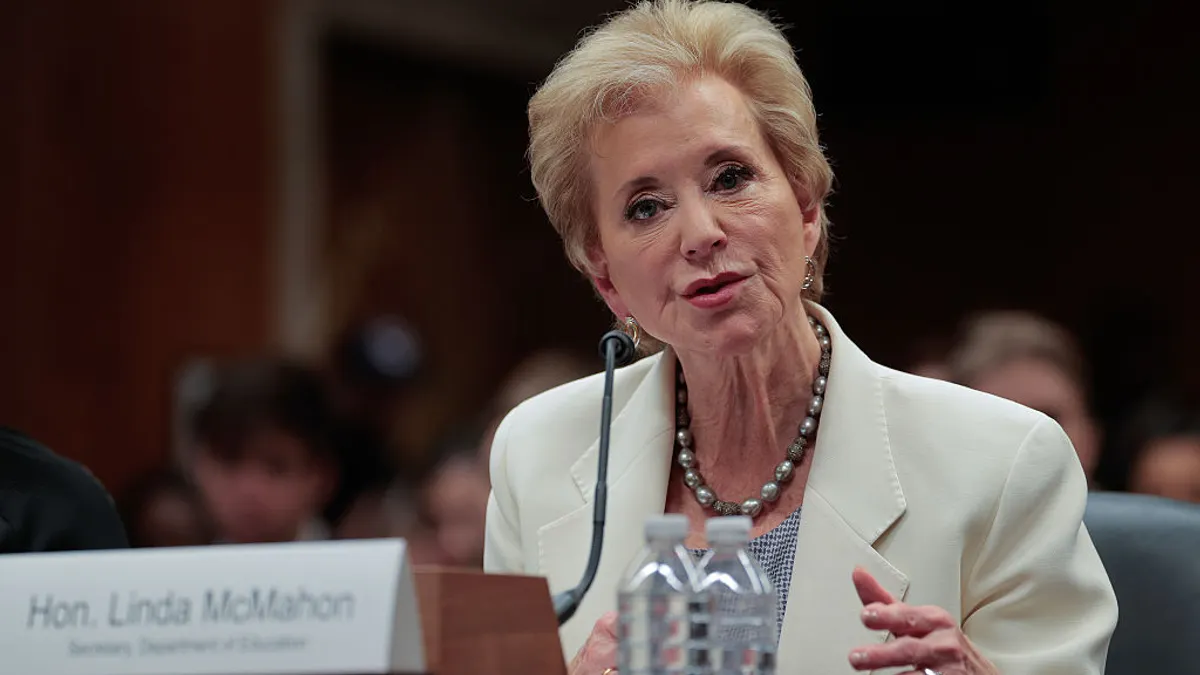Dive Brief:
- Dorothy Leland, chancellor of the University of California, Merced, on Monday announced she is stepping down after eight years in the position. Her decision caps off a series of recent leadership departures at U.S. colleges and universities.
- This month, James Gallogly, president of the University of Oklahoma, announced his resignation after less than a year in the role. Meanwhile, there has been speculation that Eloy Ortiz Oakley, chancellor of the California Community Colleges, could be on his way out after getting a vote of no confidence from the faculty association's Board of Governors.
- Other top leaders previously announced they intend to step down in the coming months. Those include Eric Kaler, president of the University of Minnesota; Judy Genshaft, president of the University of South Florida, and Eduardo Padrón, president of Miami Dade College.
Dive Insight:
Departures are expected as the academic year winds down. However, college chief executives generally are spending less time in the role than in previous years, and the rate at which they leave may accelerate in the coming years.
Some are leaving after a successful run at their institutions. During her tenure at UC Merced, for example, Leland helped grow the young university's enrollment by some 4,000 students, undertook a $1.3 billion development project to double the size of the campus and boosted its level of research activity.
Miami Dade's Padrón is retiring after nearly 25 years at the helm of an institution that today enrolls the most students of any U.S. college, according to the Miami Herald.
During his tenure, the college made significant strides in graduating minority students and improving student outcomes. Just this year, Miami Dade won the Aspen Prize for College Excellence for having graduation/transfer rates above the national average and for having no attainment gaps for students of color.
Other departures come amid controversy.
The U of Oklahoma's Gallogly announced his resignation less than a year into the job after weathering an investigation into alleged sexual misconduct by the university's former president, a racist incident on campus and criticism of some of his financial decisions, WTOP reported.
Several other college leaders have stepped down in recent years amid allegations they mishandled sexual misconduct claims on campus, including the chief executives of Michigan State University and the University of Southern California. Indeed, involuntary departures are on the rise, according to research cited by The Chronicle of Higher Education.
Even some successful runs as president — such as Genshaft's 19 years leading the U of South Florida — have been capped with controversy. Roughly two months before Genshaft's slated departure, she was sued by the former chancellor of the university's St. Petersburg campus, who alleged the president forced her to resign about two years ago, the Tampa Bay Times reported.
Leaders stepping in will need to have a "new set of skills and capabilities" to handle the growing pressures of the job, a recent Deloitte analysis argues. New presidents will have to answer to a "dizzying array of stakeholders" on and off campus; navigate the challenges of social media and a 24/7 news cycle; handle sexual misconduct and other issues on campus, and assure students and families that they're receiving a return on their investment.
Correction: A previous version of this article incorrectly identified the organization that gave Eloy Ortiz Oakley a vote of no confidence. It was the faculty association's Board of Governors.







